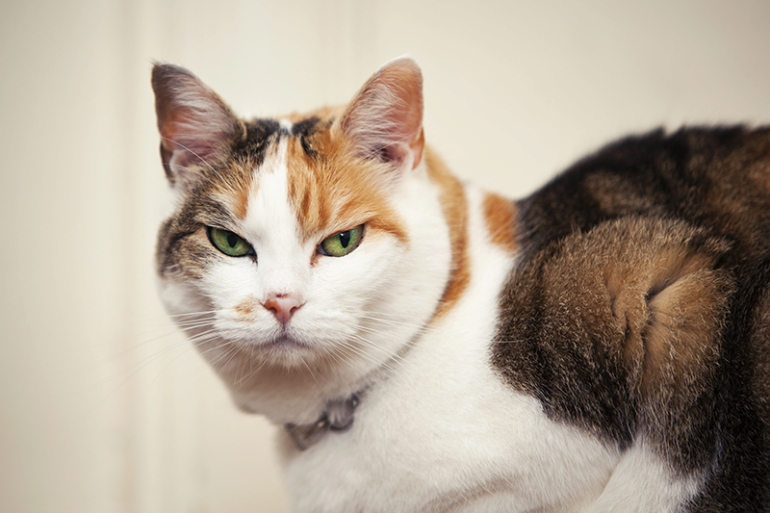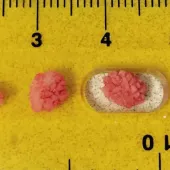Stress in cats

There are many things that can make cats stressed. Moving or getting a new family member, like a baby or an animal, can be hard for cats. Even short-term events, like going to the vet, can be stressful. To keep your cat happy, you should know both the things that could stress them out and the signs of worry.

Why do cats get stressed?
Cats like to be in charge of their surroundings. If they feel scared or nervous, they will either run away, freeze, or show defensive behaviors like hissing, spitting, or lashing out. According to their genes, cats are meant to live alone and stay away from other cats. If they have a choice, they will generally try to get away or freeze when they feel threatened because these actions are less likely to hurt them. When cats are scared, it can be hard for them to get away in modern places, like when they have to share their home with another cat.
Why are some cats more fearful than others?
Cats naturally stay away from strange things because they are scared of them. There are, however, many things that can affect how a cat reacts to its surroundings, such as its genes, how well it was socialized during its "sensitive" time (when it is most open to learning from new experiences), and any current events. This means that cats whose owners are sure of themselves around people and other cats are more likely to be sure of themselves too. It also means that kittens who have had regular, good experiences with people touching them while they were still sensitive are more likely to be friendly to people as adults. It's more likely for adult cats to show signs of nervousness or fear the next time they travel if they have had a bad experience that made them feel bad, like when they were traveling in the car.
Kittens should be socialized as much as possible so they feel good around people and other animals and learn how to behave around them. It's also helpful to help kittens get used to and avoid things in the house that aren't dangerous, like the sight and sound of the vacuum cleaner. This process is called habituation (there is more information on this in the kitten socialisation).
How do I know if my cat is stressed?
It depends on the cat's personality whether it shows worry by doing something or not doing anything. When an active cat is stressed, it will often make a lot of noise, and if it is enclosed (like in a vet's cage or a boarding cattery), it may try to get out or spend a long time trying to get attention. On the other hand, an inactive type cat often shows worry by trying to hide and being as quiet as possible. It could hide its head or body under its bed or somewhere else in the house. When cats are stressed, they often change the way they eat and go to the bathroom. They might not eat at all or eat too much, and they might start going to the bathroom outside of their litter boxes. Cats that are scared or anxious are also less likely to do usual things like play or grooming, and they are more likely to get startled.
Many things can happen when a cat is stressed, but there are some main signs you can look for in the way it moves and faces you. Cats' pupils get very big when they are upset. This could be because they are under a lot of stress from pain, fear, or worry. Stressed cats may bend their backs, flatten their ears, and stand their fur on end for a short time, like when they are startled or when an unfriendly cat comes close. If a cat is stressed for a long time, like if it has to live with another cat that doesn't like it, it might not groom itself and have a furry coat. It might also look sad and dead, curled up with its head close to its body.
In some extreme cases cats can pull their fur out (or more commonly groom an area so much the hair is removed) when they are stressed. However, there are a number of medical reasons why a cat may over-groom or lose its fur including skin complaints and allergies. If you notice your cat is losing fur or has bald patches, take it to your vet for an examination. Cats may also groom very little or stop completely if they are stressed, therefore any change in normal grooming should be monitored and reported to your vet.
Cats may exhibit various signs of stress, including:
- Changes in Appetite: Increased or decreased eating habits.
- Altered Grooming Behavior: Over-grooming or neglecting grooming altogether.
- Aggressive Behavior: Agitation, hissing, swatting, or biting.
- Hiding or Withdrawal: Seeking seclusion or avoiding social interactions.
- Vocalization: Excessive meowing, yowling, or growling.
- Litter Box Problems: Inappropriate urination or defecation.
- Excessive Scratching or Pacing: Compulsive behaviors.
- Dilated Pupils and Tense Body Language: Indicative of heightened anxiety.
What sort of things stress a cat?
Many factors can cause stress and what one cat may find stressful, another may not. However, cats are often stressed by a change in their lifestyle, routine and/or environment. Examples include a visit to the vets, a stay in a boarding cattery, a new baby, other cats in the neighbourhood, building works or renovations to the home, or a new pet. For sensitive cats, something as minor as a new piece of furniture or a change in position of the litter tray can be stressful.
Common Sources of Stress in Cats
-
Change in Environment: Moving to a new home or rearranging furniture can be disorienting for cats.
-
Introducing New Pets: The presence of a new cat, dog, or other pets can be a source of anxiety.
-
Loud Noises or Thunderstorms: Sudden, loud noises or storms can be frightening for cats.
-
Unfamiliar People: Strangers in the house or visits from unfamiliar guests can be stressful.
-
Medical Issues: Pain or discomfort due to illness can lead to heightened anxiety.
-
Changes in Routine: Cats thrive on consistency, so alterations in their daily routine can be stressful.
Is it stressful for a cat to live without access to the outdoors?
A lot of people have different ideas about how to best care for an indoor-only cat. If a cat has to stay inside because of a disability or because it lives near a busy road, it is important to meet its behavioral needs so it doesn't get stressed. To try to lower stress, it's important to make the indoor environment more interesting by adding things like hiding spots, scratching posts, high walkways, and viewing points at windows.
How can I prevent my cat getting stressed?
Stress is a part of life for all animals but too much can cause behavioural and medical problems. To minimize stress you want to make the home environment as similar to a wild lifestyle as possible with lots of opportunity for choice for your cat. These include:
- Adequate numbers of litter trays for the cats residing in the home (general rule is one per cat plus one)
- Plenty of places to gain food and water (separately) within the home
- A choice of places to rest (up high, away from hustle and bustle of household)
- Opportunities for your cat(s) to express hunting behaviour (through play and foraging games)
- A secure home. Make sure no neighbouring cats can enter your cat’s home (magnetic collared cat flap or microchip scanning cat flaps can help prevent unwanted cats in the home).
Should I see my vet if I think my cat is stressed?
Most definitely Yes. If you think your cat is stressed, you should always talk to your vet first. The vet can check for medical reasons for worry and help you find more help if the problem seems to be behavioral.
Will another cat help my cat feel calmer?
People have a lot of different mental social groups, but cats don't. A person may feel less stressed when they have company, but cats rarely feel less stressed when they have company. It is possible that adding another cat to a place where the current cat is already stressed will make the stress your cat is already feeling even worse.
It's not fun for you or your cat to have a stressed cat. If you think your cat might not be happy, learn how to spot the signs and always talk to your vet if you are worried.





